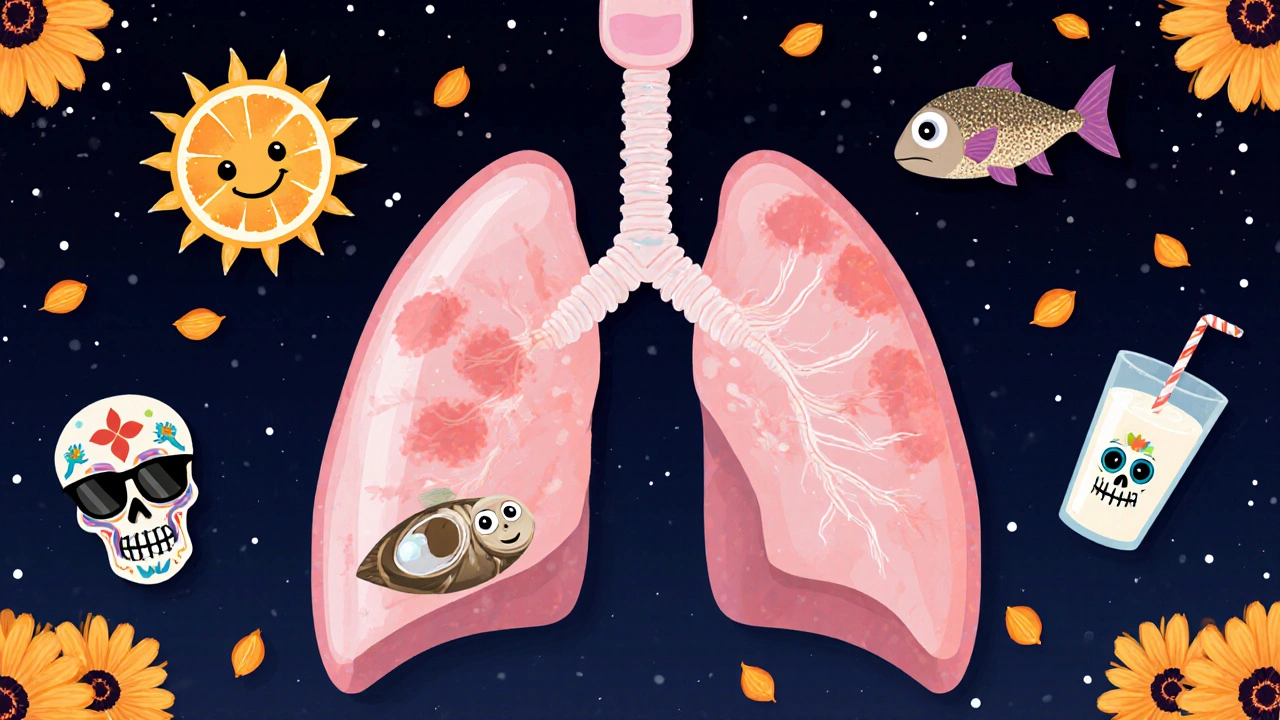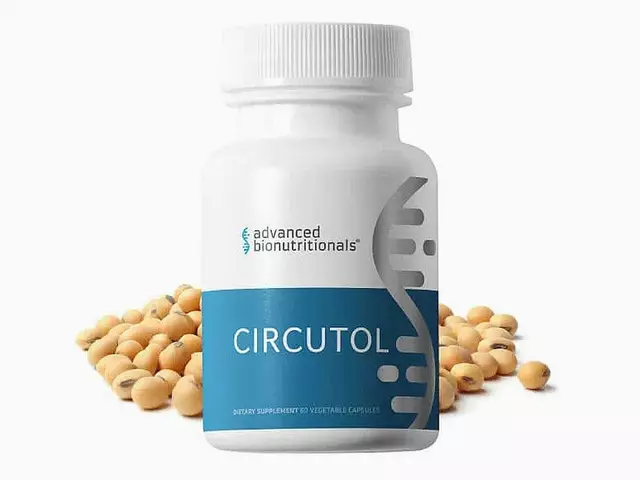Bronchitis Prevention Checklist Tracker
Daily Bronchitis Prevention Checklist
Track your nutrition habits to support respiratory health. Complete at least 5 items for optimal protection.
Your Prevention Plan
Track your daily habits to support respiratory health. Complete at least 5 items for optimal protection.
Quick Summary / Key Takeaways
- Eating a diet rich in Vitamin C, Vitamin D, zinc, omega‑3s and probiotics can lower the risk of bronchitis and speed recovery.
- Stay hydrated, limit processed foods, and avoid smoking to protect airway mucosa.
- Combine nutrient‑dense meals with simple lifestyle habits - like regular breathing exercises - for best results.
- Nutrition supports the immune system, reduces inflammation, and helps clear mucus faster.
- If symptoms persist beyond 10 days or worsen, seek medical care; food isn’t a substitute for antibiotics when needed.
What is Bronchitis?
Bronchitis is an inflammation of the bronchial tubes that carry air to the lungs. The lining becomes swollen and produces excess mucus, leading to coughing, wheezing, shortness of breath, and sometimes fever. Acute bronchitis usually follows a viral respiratory infection and clears up in a few weeks, while chronic bronchitis - a form of chronic obstructive pulmonary disease (COPD) - persists for months and is often linked to long‑term irritants like tobacco smoke.
Even though medicines can ease symptoms, the body’s own defenses are the first line of protection. That’s where Nutrition steps in.
How Nutrition Impacts the Lungs
Every cell in your respiratory system needs fuel. Nutrients act like maintenance crews: they repair airway lining, keep mucus thin, and bolster immune cells that hunt down viruses and bacteria. When you eat foods high in antioxidants and anti‑inflammatory compounds, you reduce the oxidative stress that fuels bronchial swelling.
Conversely, diets heavy in refined sugars, trans fats, and processed meats can suppress immune function and increase mucus production, making you a sitting target for bronchial infections.
Key Nutrients for Bronchitis Prevention and Recovery
Below are the nutrients most backed by research for supporting respiratory health.
- Vitamin C - powerful antioxidant that strengthens white‑blood‑cell activity and helps thin mucus.
- Vitamin D - modulates immune response; low levels are linked to higher rates of respiratory infections.
- Zinc - essential for enzyme function in immune cells and can shorten the duration of colds, a common trigger for acute bronchitis.
- Omega‑3 fatty acids - EPA and DHA reduce airway inflammation and support overall lung elasticity.
- Probiotics - maintain gut microbiome balance, which in turn influences immune signaling to the lungs.
- Hydration - water and herbal teas keep mucus thin and easier to expel.

Comparison of Top Bronchitis‑Friendly Nutrients
| nutrient | main food sources | typical daily amount | primary bronchitis benefit |
|---|---|---|---|
| Vitamin C | citrus, strawberries, bell peppers | 75-90 mg | antioxidant, mucus thinning |
| Vitamin D | fatty fish, fortified milk, sunlight | 800-1000 IU | immune modulation |
| Zinc | oysters, pumpkin seeds, beef | 8-11 mg | faster viral clearance |
| Omega‑3 | salmon, walnuts, flaxseed | 250-500 mg EPA/DHA | reduced airway inflammation |
| Probiotics | yogurt, kefir, sauerkraut | 1-10 billion CFU | gut‑lung immune link |
Building a Bronchitis‑Friendly Meal Plan
Here’s a simple 3‑day plan that hits all the key nutrients without feeling like a medical regimen.
- Day 1 - Citrus Boost
- Breakfast: Greek yogurt with sliced kiwi, a handful of walnuts, and a drizzle of honey.
- Lunch: Spinach salad with orange segments, grilled chicken, pumpkin seeds, and a lemon‑olive‑oil dressing.
- Dinner: Baked salmon, quinoa, and steamed broccoli topped with a squeeze of lemon.
- Day 2 - Vitamin D Focus
- Breakfast: Fortified oat milk smoothie with banana, blueberries, and a scoop of whey protein.
- Lunch: Tuna wrap with whole‑grain tortilla, mixed greens, and avocado.
- Dinner: Turkey meatballs in tomato sauce, served over whole‑wheat pasta, with a side of roasted Brussels sprouts.
- Day 3 - Probiotic Power
- Breakfast: kefir parfait layered with granola and fresh berries.
- Lunch: Miso soup with tofu, seaweed, and sliced mushrooms; side of edamame.
- Dinner: Stir‑fried shrimp, bell peppers, and snap peas in a ginger‑garlic sauce, over brown rice.
Snack ideas: carrot sticks with hummus, a piece of fruit, or a small handful of almonds. Aim for at least 2 liters of water a day, and sip herbal teas like ginger or peppermint to keep mucus thin.
Lifestyle Habits That Complement Nutrition
Food alone won’t cure chronic bronchitis, but pairing a nutrient‑dense diet with a few everyday habits can make a noticeable difference.
- Stay smoke‑free - even secondhand smoke hampers airway healing.
- Practice humidified breathing - using a cool‑mist humidifier adds moisture to the air and eases cough.
- Gentle aerobic activity - brisk walking 20 minutes a day improves lung capacity and circulation.
- Regular hand washing - reduces exposure to viruses that trigger acute bronchitis.

When Nutrition Isn’t Enough: Seek Professional Care
If you experience any of the following, medical evaluation is crucial:
- Fever above 101 °F lasting more than 48 hours.
- Chest pain or shortness of breath at rest.
- Cough that produces blood‑tinged sputum.
- Symptoms persisting beyond 10 days without improvement.
Doctors may prescribe antibiotics for bacterial bronchitis, bronchodilators, or steroids for severe inflammation. Nutrition remains supportive but should never replace prescribed treatment.
Daily Nutrition Checklist for Bronchitis Prevention
- Eat at least two servings of vitamin‑C‑rich fruit or veg.
- Include a source of vitamin D daily - fortified dairy, fatty fish, or 15 minutes of sunlight.
- Consume zinc‑rich foods three times a week.
- Incorporate omega‑3s twice weekly.
- Enjoy probiotic foods daily.
- Drink 8‑10 glasses of water or herbal tea.
- Avoid processed snacks, sugary drinks, and excessive alcohol.
- Maintain a smoke‑free environment.
Stick to this list, and you’ll give your lungs the best chance to stay clear, heal faster, and resist future attacks.
Bottom Line
While no single food can guarantee you’ll never get bronchitis, a diet packed with bronchitis nutrition strategies-rich in vitamins, minerals, healthy fats, and probiotics-creates a robust immune shield and eases airway inflammation. Pair those foods with hydration, smoke‑free living, and regular light exercise, and you’ll have a solid, natural defense against both acute flare‑ups and chronic lung wear.








10 Comments
Sarah Riley October 22, 2025
The pathophysiology of bronchial inflammation is modulated by micronutrient bioavailability; insufficient Vitamin C compromises mucosal antioxidant capacity. Consequently, dietary optimization constitutes a prophylactic vector.
Tammy Sinz October 24, 2025
Your guide nails the key nutrients, but let's emphasize dosage consistency. A daily 500 mg of Vitamin C split across meals maintains plasma levels better than a single bolus. Also, prioritize fermented kefir in the morning to seed the gut‑lung axis early. Keep the tone of your plan pragmatic, patients need actionable steps, not just a list.
Joanne Ponnappa October 26, 2025
Great info! 🍊🥦 Easy to follow and tasty. 👍
Michael Vandiver October 28, 2025
Love the meal plan 😍 it totally hits the spot 🍣🥗 keep the tips coming 🚀
Emily Collins October 29, 2025
The mere thought of mucus‑laden coughs haunts my midnight dreams.
Rachael Turner October 31, 2025
The lungs, an often overlooked organ in diet discourse, deserve a holistic narrative. When we feed the body with antioxidant-rich compounds, we are essentially arming the immune sentinels that patrol our airways. Vitamin C, beyond its scurvy fame, acts as a scavenger of free radicals that would otherwise degrade epithelial integrity. Vitamin D, synthesized under sunlight's gentle kiss, calibrates the cytokine orchestra, preventing an overzealous inflammatory crescendo. Zinc, the modest trace metal, is a cofactor for countless enzymatic reactions that dismantle viral incursions. Omega‑3 fatty acids introduce a fluidity to cell membranes that dampens inflammatory cascades. Probiotic cultures, residing in the gut, send metabolic whispers through the gut‑lung axis, modulating respiratory immunity. Hydration, the silent conduit, ensures mucus remains a slip‑stream rather than a viscous trap. Yet, nutrition alone cannot rewrite the genetic predisposition of chronic bronchitis, nor can it replace prescribed bronchodilators when obstruction spikes. Lifestyle variables-smoking cessation, humidified air, gentle aerobic activity-intersect with diet to shape outcomes. The synergy of these elements echoes an ancient principle: balance begets resilience. In practice, a three‑day meal plan that cycles citrus, fatty fish, and fermented foods operationalizes this theory. Each meal, thoughtfully composed, delivers a micro‑dose of the aforementioned nutrients, reinforcing the mucosal barrier daily. Moreover, the act of mindful eating, free from processed sugars, reduces systemic inflammation that would otherwise exacerbate airway swelling. Therefore, consider nutrition as a cornerstone, not a solitary cure, in the architecture of pulmonary health. In the end, the body responds to consistent, evidence‑based choices, rewarding us with clearer breaths and fewer clinics visits.
Vin Alls November 2, 2025
Think of your diet as a palette, each nutrient a brushstroke painting resilient lungs. Load up on citrus-grab an orange each morning, then drizzle lemon over salmon at dinner. Swap processed snacks for a handful of pumpkin seeds; they pack zinc and crunch. For omega‑3s, roast walnuts with a pinch of sea salt, or blend flaxseed into a smoothie. Probiotic power? Stir a spoonful of kefir into oatmeal before you hit the gym. Hydration is the canvas-sip water like it's liquid gold. Pair these foods with a 20‑minute walk and a humidifier, and you’ll see inflammation recede like fog at sunrise.
Tiffany Davis November 3, 2025
Thank you for the detailed suggestions. I’ll integrate the citrus and seed ideas into my weekly shopping. The emphasis on timing and pairing with light exercise is useful.
Don Goodman-Wilson November 5, 2025
Oh sure, because a handful of walnuts will magically cure years of smoking damage-nice myth.
Bret Toadabush November 7, 2025
they dont want u to know the real cure is just fresh air and no pharma propaganda lol